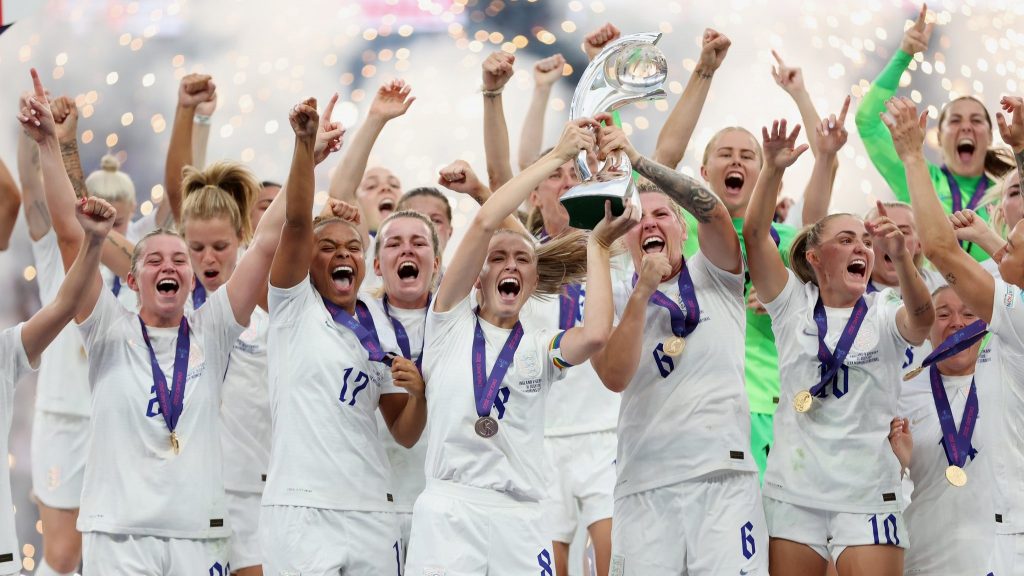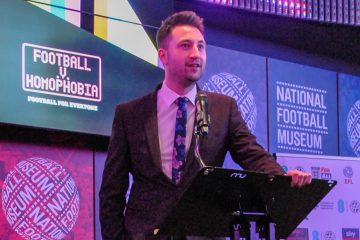Lionesses’ success still feels like a dream – let’s make LGBTQ+ inclusion in sport a reality
Growing up with a love of football, Katy Smith hoped to have a future in the game – but sexism and homophobia saw her drift away from the pitch in her early teens. However, getting into coaching a few years later and the celebratory mood generated by England’s triumph at the Euros have reignited her passion. She explains why everyone should get to benefit from the momentum of women’s football…
By Katy Smith

A little imagination helps you to dream big when you’re young – but the thought of Leah Williamson lifting the Euros trophy in front of 90,000 fans at Wembley while wearing a rainbow captain’s armband would have been pure fantasy football for me.
I was 14 when I gave up playing, seven years after I started with a girls division; later I played for my school team too. During this time, I repeatedly found myself hearing homophobic and misogynistic language – sometimes it was directed at me, both on and off the pitch.
Most of the time, our coaches turned a deaf ear; often, it was the parents who used this language, or they appeared to support it. These experiences at grassroots and in school eventually led me to quit, and for a few years at least, the discrimination killed off my enjoyment of sports.
However, even though it impacted me negatively at the time, it’s also one of the things which prompted my return to football 18 months ago – this time not as a player, but as a youth coach for a grassroots team girls’ section.
Now I find that coaching is giving me the opportunity to be the queer role model I hoped to see in sports when I was younger.
The football pitch is the only place I’m really out and open about my sexuality. The time I spend there allows me to show all the kids I work with that they are valued as much as anyone else. I regularly reinforce that gender and sexuality shouldn’t affect their experiences or opportunities when playing football, or any sport for that matter.
I try to be the person who shares that message. It’s one I would have liked to have heard 10 years ago.
On the evening of the Euros final, the girls and other people in our club – like many – chose to watch the match together. The recognition and pride I witnessed when some of the players saw Williamson wearing that rainbow armband and later standing to lift the trophy while wearing it was so great.
This symbol of inclusion sparked a half-time conversation within our squad as to why some people still find it problematic to have queer players in sports. The girls said they just like to see players being themselves, and to my admiration, they continued to talk about how they would do anything they could to make queer players feel welcome.
Throughout my years of playing football, I struggled to find people who were out and proud about their sexuality, and as I began to understand more about myself, that became increasingly disheartening.
For many young queer people, myself included, the process of discovering your identity is difficult, and I found the lack of representation and visibility hard to deal with. It left me questioning why this was.
As a younger child, I spent years convinced that I was simply not ‘normal’, and when I started noticing that there was nobody like me visible in the sports that I loved, it only added to those negative beliefs.
However, in recent times, queer people in sports have become gradually more visible, especially in women’s football.
That’s extremely significant to myself and to many others, and it highlights the change which is starting to happen. The simple gesture of wearing the rainbow armband reinforces the support and acceptance that’s increasing in the game. Seven of the 23 players in the Lionesses squad are out as LGBTQ+ – having role models like these stars is something that can only have positive implications, some of which I’ve experienced myself.
The representation says that your identity shouldn’t be a barrier – you can achieve what you want to. This is the message that clubs and teams should be reinforcing regularly. Jake Daniels’ recent coming out has done that too – the Blackpool forward is currently the only out professional male player in the UK. Hopefully, his decision helps to carve a pathway for more pro male players to take the courageous steps to come out, as this will break down negative stereotypes and assumptions and ultimately begin to drive further change.
We’re beginning to see the impact that these events are having and will continue to have on players and supporters. To me, it’s a welcome reinforcement of the fact that not fitting ‘the norm’ should never stop you from doing what you love and are good at.
Tom Daley’s appearance alongside LGBTQ+ activists bearing Progress Pride flags at the Birmingham 2022 Commonwealth Games opening ceremony recently sparked more conversations about acceptance and accessibility in sport and society.
Daley, who was one of the athletes completing the Queen’s Baton Relay, was raising awareness of the prejudice and discrimination that many LGBTQ+ people face around the world. Out of 56 Commonwealth member states, 35 retain laws that criminalise same-sex intimacy. In the majority of cases, these laws were introduced onto the statute books via British colonialism.
“I’ve experienced homophobia all my life,” said Daley, “competing in countries where it’s illegal to be me and where I don’t feel safe to leave the venue I’m competing in.” His statement reminds us that legislation is harder to break down than social and personal opinions or expectations. Actively attempting to change negative mindsets and perceptions is therefore essential in the fight for equality.
Sports clubs should certainly aim to create environments in which everyone can enjoy the activity and feel a sense of family. The more work that is done around inclusion – based on gender, sexuality or other factors that shape a person’s identity – the less of a taboo subject these become.
Even small steps and simple actions can lead to positive changes, such as rainbow armbands, and matches in which players wear rainbow laces. These gestures are subtle and almost effortless ways of showing support.
From a coaching point of view, challenging negative language or stereotypes if you hear them during a session, and educating why this is wrong or harmful, is not a strenuous task. It can often change the point of view of players, and sometimes parents.
As a club, the responsibility of creating a safe and positive environment for all players sometimes comes with having difficult conversations or making tough decisions, which can deter managers or coaches from taking a stand. This should not be the case. The Football v Homophobia campaign is available for clubs of any level, including school teams, to take part in – it aims to help clubs become more inclusive, and provides them with resources to correctly educate players, coaches and parents on creating an LGBTQ+ friendly club.
By creating an open and inclusive atmosphere, it gives members of a club a positive space to be themselves and enjoy the sport they are playing without fear of adverse consequences.
In the last few years, the Football Association has begun to take an increasingly active role in fighting homophobia and discrimination. Recently, during a WSL match, Spurs coach Rehanne Skinner was subjected to homophobic language from opposition coach Marcus Bignot. Following an investigation, the FA found him guilty of misconduct, and in breach of FA rule E3. On top of this, his club Birmingham City terminated Bignot’s coaching agreement and publicly condemned his action; he also lost his position coaching the England Under-19 squad.
For me, this more active approach from FA organisations marks the change that is beginning to happen, and means more players and coaches will hopefully be playing in safer environments, especially where they can speak up about any discrimination they might face – something I felt unable to do in the past.
Creating more pathways for the next generation of players and coaches is paramount. Following the Euros final, the Lionesses players addressed this in an open letter to the two candidates vying to be the UK’s next Prime Minister, Rishi Sunak and Liz Truss. The letter reminded the politicians that almost half of schools do not offer the same extra-curricular football opportunities to girls that boys get while 40% still do not offer any opportunities in P.E. lessons.
The importance of supporting female staff – another significant topic in the letter – is something that is still a problem in sports. Having more inclusive environments will allow for more diversity in terms of staff as well as players. Everyone wants to feel valued for their identity and authenticity just as much as their ability, whatever their role.
Having queer role models in sport will always have a positive outcome – but often in more ways than people might think. As more players, coaches and managers come out, the stigma surrounding the inclusion, representation and acceptance of those individuals is reduced. The impact is not just on those who look up to and watch openly queer sports people, but on the players and staff themselves. For me, having a sense of freedom to express myself while being accepted makes me feel like I fit in somewhere, something that I still struggle with a lot sometimes.
Furthermore, it allows players to see people like me doing what I enjoy and knowing I can be myself with no unwanted repercussions. This is important from a well-being perspective – queer people are disproportionally affected by mental health issues, with over half of the LGBTQ+ community having reported experiences of depression, more than 60% saying they have suffered from anxiety, and the majority reporting self-confidence or self-esteem issues. This can be due to a variety of internal and external factors, some of which are examples or contributors to minority stress.
Exercise is highly recommended by mental health professionals, but barriers still deter so many queer people from playing sports. By taking steps towards inclusion, more can enjoy team sport and exercise, boosting their mental health and self-esteem.
The Lionesses brought the country together. Now it’s on all of us to heed the words of their open letter and give the next generation of girls what they deserve – the chance to make their dreams come true.
Sports Media LGBT+ is a network, advocacy, and consultancy group that is helping to build a community of LGBTQ+ people and allies in sport. We’re also a digital publisher and proud to be a media partner on Pride House Birmingham. Learn more about us here.
We’re interested in your news and stories. Share with us and tap into a worldwide audience through our Google News affiliate website and our popular social channels with over 10,000 followers. Contact us to discuss how we can help you.



1 Comment
Leah Williamson Is Shaping The Way For Queer Sports Queens - Girlhood Magazine · 10/08/2025 at 2:18 pm
[…] a leader, she embodies the message that sexuality should never limit your ambition and dreams. A Sports Media LGBT+ editorialist explained how young, queer fans described her rainbow armband celebration as a moment […]
Comments are closed.